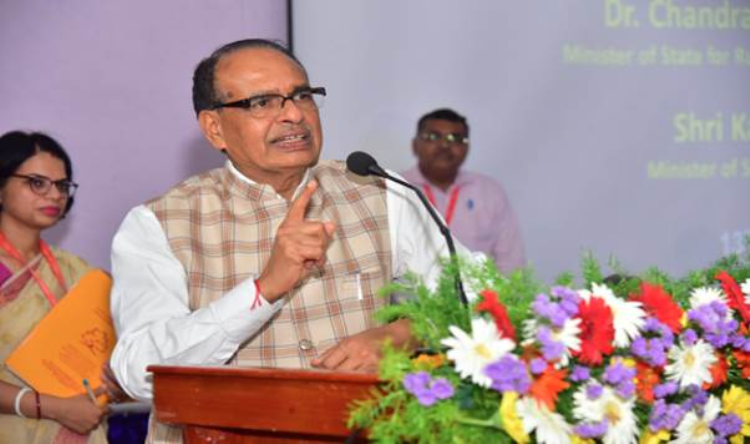Viksit Krishi Sankalp Abhiyan Ignites National Drive for Farm-Led Prosperity
Under the leadership of Prime Minister Shri Narendra Modi, Shri Chouhan noted that food grain production has risen by 40% over the past 11 years.

- Country:
- India
In a major national push for modernizing Indian agriculture and ensuring sustainable prosperity for farmers, Union Minister of Agriculture & Farmers’ Welfare and Rural Development, Shri Shivraj Singh Chouhan, hailed the Viksit Krishi Sankalp Abhiyan as a watershed campaign that has sparked a transformative movement across the country. Launched with the vision of creating a farmer-first, field-driven, and research-backed agricultural ecosystem, the campaign has reached an unprecedented scale, catalyzing institutional reforms, grassroots engagement, and policy realignment.
A Groundbreaking Field Campaign
Over 2,170 multidisciplinary teams comprising agricultural scientists, field officers, and research experts fanned out across 1.42 lakh villages, directly engaging with more than 1.34 crore farmers. The massive outreach initiative was marked by inclusive participation from Chief Ministers, Union and State Ministers, MPs, MLAs, local representatives, and Panchayat leaders, reflecting a whole-of-government approach.
At the heart of the campaign were thousands of Kisan Chaupals, where farmers engaged in real-time dialogues with scientists and policymakers on crop suitability, climate adaptation, indigenous practices, pest control, and productivity enhancement.
Vision for a Sustained National Movement
Calling the campaign not a one-off, but the beginning of a continuous national movement, Shri Chouhan announced that Viksit Krishi Sankalp Abhiyan will be relaunched in the Rabi season with strengthened institutional coordination and focused action plans.
“Our mission is to bridge the last-mile gap between research labs and farm fields. We are setting the foundation for ‘One Nation – One Agriculture – One Team,’ a unified national vision where all stakeholders—farmers, scientists, institutions, and governments—work in tandem to uplift agriculture,” Shri Chouhan said.
Strategic Institutional Reforms
To ensure long-term and district-level transformation, the Minister unveiled several game-changing measures:
-
Krishi Vigyan Kendras (KVKs) will now serve as Nodal Agriculture Institutions in each district, acting as the nerve centers for technology dissemination, grievance redressal, and field demonstrations.
-
KVK scientists are mandated to spend three days per week in the field, engaging with farmers and identifying ground-level issues.
-
Shri Chouhan pledged to lead by example, committing to farm visits twice a week to connect directly with cultivators and assess on-ground realities.
Furthermore, the Indian Council of Agricultural Research (ICAR) will appoint a State-wise Nodal Officer to coordinate scientific trials, oversee adaptive research, and maintain continuous dialogue with state governments. A centralized coordination mechanism will also be established to streamline efforts across institutions working for farmer welfare.
Immediate Priorities: Seeds, Pesticides, and Sustainability
Two pressing concerns—substandard seeds and counterfeit pesticides—were flagged during the campaign. In response, the Ministry will pursue:
-
Strengthening of the Seed Act
-
Enhanced quality control
-
Strict certification protocols for inputs
“Our farmers deserve nothing less than the best,” Shri Chouhan said. “High-quality seeds, reliable inputs, and trusted advice are foundational to profitable farming.”
The Minister also stressed the need to reduce input costs, promote sustainable practices, and improve soil health. These were highlighted as critical levers for making agriculture a dignified and profitable livelihood for millions.
Inclusive Outreach: Focus on Marginalized and Strategic Areas
The campaign’s robust design ensured special attention to underserved, tribal, and border regions:
-
In 177 tribal districts, over 8,000 programs were conducted, reaching 18 lakh farmers.
-
In 112 aspirational districts, teams covered 6,800 villages and interacted with 15 lakh farmers.
-
Coverage also extended to nearly 100 border districts and vibrant villages, showcasing the intent to leave no farmer behind.
Insights from the Field: A Learning Laboratory
The campaign served as a two-way learning exercise. Two key insights emerged:
-
Localized research must take precedence. Central directives should be customized based on agro-climatic realities and farmer feedback.
-
Farmers as Innovators: Many demonstrated homegrown solutions—ranging from pest traps to water-saving irrigation techniques—that surprised even senior scientists.
Issues raised by farmers during the Kisan Chaupals included:
-
The need for an integrated climate change response in agriculture.
-
Simplified organic certification processes.
-
Development of a national fodder policy.
-
Strengthening Farmer Producer Organizations (FPOs) for real-world functionality.
Shri Chouhan said these inputs would shape future strategies: “The field is the truest laboratory. The farmer’s voice must guide our research and policymaking.”
Upcoming Key Events and Follow-Up Plans
To ensure momentum is maintained, the Minister announced a roadmap for strategic follow-up:
-
A national hybrid meeting on June 24 at Pusa Institute, involving scientists, state agriculture ministers, and ICAR officials, to review campaign outcomes and identify future priorities.
-
A Soybean Stakeholder Consultation on June 26 in Indore, followed by targeted missions on cotton, sugarcane, pulses, and oilseeds.
-
Development of dedicated Action Plans for major crops, incorporating state-specific inputs and institutional capabilities.
A Decade of Growth and a Future of Promise
Under the leadership of Prime Minister Shri Narendra Modi, Shri Chouhan noted that food grain production has risen by 40% over the past 11 years. He emphasized that the government’s mission is to achieve:
-
National food security
-
Nutritional sufficiency
-
Agricultural profitability
-
Sustainable soil health
“India must emerge as a global food basket,” the Minister declared.
Also present at the press briefing were Shri Devesh Chaturvedi, Secretary (MoA&FW) and Dr. M.L. Jat, Secretary (DARE) and Director General, ICAR, who reiterated institutional support for the campaign’s next phases.
Viksit Krishi Sankalp Abhiyan is not just a policy campaign—it is a mass movement for India’s agricultural renaissance. By connecting labs to lands, policy to practice, and science to soil, it promises to redefine Indian farming as innovative, inclusive, and income-generating. With a farmer-led, field-focused model, the campaign sets the stage for an agricultural revolution powered by knowledge, equity, and unity.










